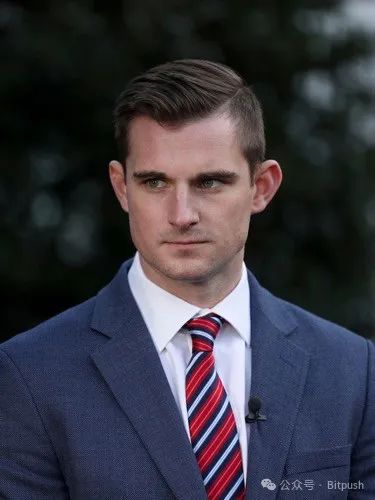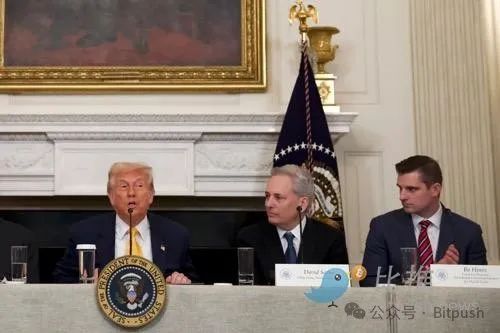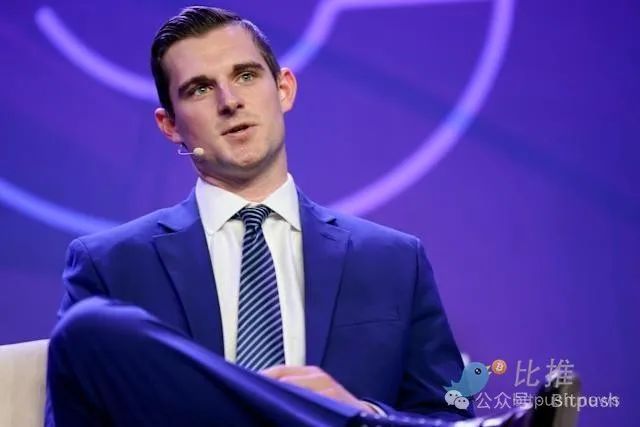
In March of this year, when Donald Trump hosted the first cryptocurrency summit at the White House, he was surrounded by several top-level advisors. To his right was Treasury Secretary Scott Bessent, and to his left was David Sacks, the head of cryptocurrency and artificial intelligence affairs and a venture capital giant. However, sitting right next to Sacks was a person who had been completely unknown to everyone in the room just a few months prior: 29-year-old former congressional candidate and college football wide receiver Bo Hines.
Bo Hines had assisted Trump’s campaign team’s top super PAC with advertising matters, and Trump had appointed Hines to lead a radical plan aimed at formulating cryptocurrency-friendly regulatory policies and overturning the Biden administration's crackdown on the industry.

On March 7, 2025, U.S. President Trump with David Sacks (center) and Bo Hines (right) at the White House Digital Asset Summit
From Unknown to Rising Star
In the first 30 days of serving as the Executive Director of the "Presidential Advisory Council on Digital Assets," Bo Hines has become a prominent figure in the cryptocurrency field—numerous CEOs and billionaire investors are eager to book time with him, and lobbyists are rushing to meet him face-to-face.
Bo Hines' schedule, obtained by Fortune magazine through the Freedom of Information Act, shows that in the first 30 days of his position, he met with over 50 cryptocurrency lobbyists, investors, company founders, institutional officials, and bankers.
His meeting counterparts included Chris Dixon and Marc Andreessen from the top Silicon Valley investment firm Andreessen Horowitz, Brad Garlinghouse, CEO of Ripple, and Caroline Butler, head of digital assets at BNY Mellon.
These meetings took place at the White House, in cafes, via Zoom video conferences, or at Washington's oldest dining salon, Old Ebbitt Grill.
"I want to meet everyone in this field—big players, small players," Hines said in a recent interview with Fortune at the Israeli-American style café Tatte near the White House, "I want to hear everyone's thoughts."
Despite David Sacks having decades of business experience from his early days at PayPal and Craft Ventures and holding a higher position, Hines, who is relatively unknown, has taken on more daily responsibilities due to Sacks being a part-time government employee (limited to 130 working days per year). A spokesperson for the Office of Science and Technology Policy (OSTP) insisted that the two are "working side by side."
At his desk on the fourth floor of the Eisenhower Executive Office Building, Hines has become one of the most influential figures in the crypto world. He is effectively the main liaison between the White House and the cryptocurrency industry, dedicated to transforming the industry's grievances into concrete policies.
As Trump's tariff offensive stirs global markets and leads to sharp fluctuations in digital asset prices, Hines faces more challenges. Trump's erratic economic policies have caused blockchain-related companies' stock prices to plummet, and a potential economic crisis could further suppress the increasingly traditional stock market-linked crypto market. In short, Trump's intermittent tariff war could reverse the economic progress the blockchain industry has made in recent years.
To understand the situation of Trump's cryptocurrency agenda in the initial months and the person trying to execute that agenda, Fortune interviewed the young man and spoke with more than ten individuals who have met or talked with him since January. Most requested anonymity due to the privacy of the discussions.
They commented that while Hines lacks experience in cryptocurrency, he learns quickly and is eager to understand this rebellious industry seeking legitimacy—even as the industry is embroiled in factional struggles. "It's like he's drinking from a fire hose," said a cryptocurrency executive and Washington insider, "For anyone in the cryptocurrency field, he is the first point of contact with the White House."
Crypto – From the Margins to the Center
When Hines' spokesperson suggested meeting at Tatte near the White House, he was delayed by previous meetings and mistakenly went to two wrong locations. When he finally arrived at the third Tatte of the day (dressed in a dark gray suit and smiling), he immediately dove into the topic of cryptocurrency.
With a clean appearance and a neat hairstyle, Hines carries the polished demeanor honed from two failed congressional campaigns in North Carolina (2022 and 2024). He speaks rapidly, answers decisively, repeatedly praises Trump, and insists that cryptocurrency regulation should become a bipartisan consensus. Clearly, this 29-year-old does not want to be seen as a political novice but rather as a Trump ally who can get things done.

"We respect the president, appreciate his work, and admire his 'America First' stance—this applies to the crypto space as well."
Once dominated by outsiders and government skeptics, the cryptocurrency industry has recently aligned itself with Washington politicians. FTX founder Sam Bankman-Fried spent tens of millions of dollars supporting pro-blockchain politicians in an attempt to push for comprehensive regulatory legislation. However, following the collapse of his exchange, the Biden administration launched enforcement actions, suing leading companies like Coinbase (the SEC accused it of failing to register in compliance).
Led by industry giants like Coinbase, blockchain-related groups and individuals donated nearly $250 million to pro-crypto politicians from both parties in the last election cycle. Their efforts paid off: Trump, who once called Bitcoin a "scam," transformed into a crypto evangelist. During his campaign, he promised to establish a federal Bitcoin reserve, promote crypto-friendly legislation, and attracted support from top venture capitalists like Andreessen Horowitz, who had previously complained about being sidelined by the last administration.
After winning the election in November 2024, Trump began to fulfill his promises, including appointing Solana supporter David Sacks and Hines to the Office of Science and Technology Policy under the presidential administration. After taking office, Trump signed several executive orders: establishing a crypto policy working group led by David Sacks and creating a government strategic crypto reserve.
Unlike the Biden administration, Hines has become a friendly interface for industry executives and policy advisors. An executive who has met with Hines five times stated that due to David Sacks' limited time and the need to balance AI policy, Hines acts more like a "thought collector" for the crypto industry. "David Sacks only meets with the CEOs of the top 20-40 companies," the executive said, "Hines can meet with the next 100." A lobbyist revealed that Hines is even willing to proactively provide his cell phone number.
Trump's crypto agenda includes pushing Congress to pass stablecoin regulatory legislation and assisting the SEC in formulating token issuance guidelines. However, for executives, the primary goal is simply to "get into the room." Although Trump initially planned to form an industry leader "crypto committee," the White House shifted to hosting a summit due to "too much competition for seats" (as described by one executive). Hines claims this is a misinterpretation of the outside world's "enthusiasm," emphasizing it is to "hear more voices."
Even the hosting of the first White House crypto summit sparked a "battle for invitations" among industry leaders—the final list was not announced until the day of the event, with about 25 executives (mostly Trump campaign donors) making the cut. "Many people's egos were bruised," described one lobbyist, likening the White House to the "Wild West," lacking organization and communication.
Despite this, the March summit still marked a significant victory for the crypto industry. Hines' seat was just one away from Trump, witnessing the big names that had filled his schedule over the past month.
"This is the White House—who wouldn't want to come?" Hines said, "The president hosting this event for the industry signifies a major change, indicating that this industry is maturing."
For some observers, Trump's crypto policy stands out amid the chaos in Washington. "Crypto has not yet been caught up in the other messes in Washington, which is remarkable," said lobbyist Scott Shewcraft, who works with several financial services companies.
However, Amanda Fischer, former chief of staff to ex-SEC Chairman Gary Gensler and now policy director at the left-leaning think tank Better Markets, expressed deep concerns. She believes the government's establishment of a crypto reserve to support specific asset prices and certain executive orders could erode the independence of federal agencies. "Their policy actions will benefit a select few individuals and companies while sacrificing American investors and the stability of the financial system."
The greater challenge comes from Trump's tariff war. Bitcoin surged from $70,000 to over $100,000 between Trump's election (November 2024) and inauguration, but plummeted 10% after the tariff announcement on April 2 (with some rebound due to a rollback of Trump's policies). Related company stocks were also hit hard: Coinbase's stock experienced its worst quarter in two years, and the tariff announcement led to a further 15% drop, with some recovery after the policy rollback.
When Fortune inquired about the market turbulence, the OSTP spokesperson did not respond directly, only stating, "The American people will benefit from the president's leadership in the digital asset space."
Still in the Early Stages, Heavy Responsibilities Ahead
From an external perspective, Hines does not seem like the best candidate to lead Trump's crypto agenda. Despite his close relationship with Trump, he has limited experience in the crypto field and had little prior contact with large crypto companies.
In 2014, after the Bitcoin St. Petersburg Bowl (a college football game) sponsored by the cryptocurrency company BitPay, Hines became enthusiastic about crypto trading.
Later, Hines co-founded the investment company Nxum Group based in Charlotte and led its political department. According to disclosures from the Federal Election Commission, a week before the 2024 election, Nxum donated $1 million in advertising to MAGA Inc. (one of the largest super PACs supporting Trump). He is also the CEO of Today Is America, an investment company under Nxum that once managed a social media campaign promising to donate token sale proceeds to conservative youth organizations.
Hines began his brief political career four years after graduating from Yale University, running twice for the North Carolina House of Representatives (both unsuccessful). Trump endorsed him in 2022, but it did not help him win.
Since Trump took office, the crypto industry has achieved some goals: the SEC dropped its lawsuits against Coinbase and Ripple; the president pardoned Ross Ulbricht, the founder of the dark web market Silk Road—this prisoner, sentenced to double life for aiding drug trafficking and money laundering, had received lobbying support for a pardon from the liberal faction of the crypto industry.
But Hines' path ahead is still not easy, with the primary agenda being to push for stablecoin regulatory legislation (if passed, this would become the first significant legislation for the blockchain industry). Hines stated that bipartisan consensus is crucial for the legislation, although he admitted that he has not yet engaged with any Democratic lawmakers, noting that Republicans are collaborating across party lines while he focuses on connecting with policy organizations that interact with Democratic lawmakers.
Since winning the election in November 2024, Trump has implemented comprehensive reforms to cryptocurrency regulation:
- Appointed David Sacks and Bo Hines as White House crypto advisors
- Signed an executive order to establish a U.S. Bitcoin reserve and digital asset reserve (assets derived from criminal civil forfeiture)
- Pardoned Ross Ulbricht, the founder of Silk Road
- Hosted the first White House crypto summit, inviting 25 industry leaders to discuss policies
- Repealed Biden-era crypto policies and established a working group composed of the Treasury Secretary, Commerce Secretary, and others to advance blockchain regulation
- Requested Congress to submit two key crypto bills before the August recess
An even more daunting task is to promote comprehensive crypto legislation to establish a regulatory framework for token issuance, exchange operations, and more, ending years of compliance uncertainty in the industry. Trump hopes to sign these two bills before the August congressional recess. "We will do everything we can to push this forward," Hines said, "The president is very determined to fulfill his commitments to the industry."
In addition to legislation, Hines is also communicating with agencies like the SEC (which is shifting towards a more lenient regulatory stance) and is considering hosting summits focused on subfields such as mining, exchanges, and venture capital.

This new dad also hopes to balance his career and family—he and his wife welcomed a son last fall, with his wife spending about a quarter of her time in North Carolina while Hines is almost permanently based in Washington. "I hope that when my son grows up, he can see that his father played an indispensable role in driving the financial revolution and helping America move forward."
This article is sourced from: Fortune
Translation and compilation by: Bitpush News
免责声明:本文章仅代表作者个人观点,不代表本平台的立场和观点。本文章仅供信息分享,不构成对任何人的任何投资建议。用户与作者之间的任何争议,与本平台无关。如网页中刊载的文章或图片涉及侵权,请提供相关的权利证明和身份证明发送邮件到support@aicoin.com,本平台相关工作人员将会进行核查。




